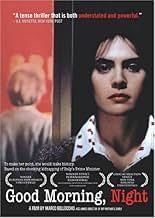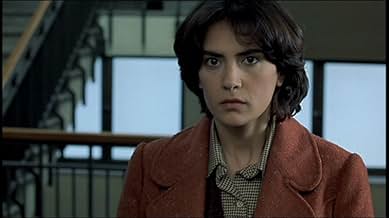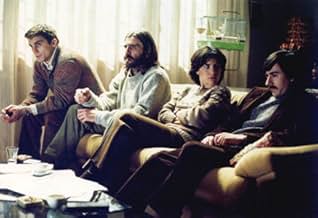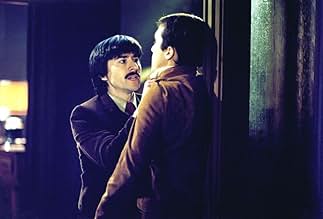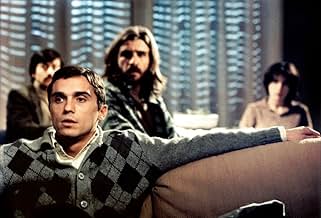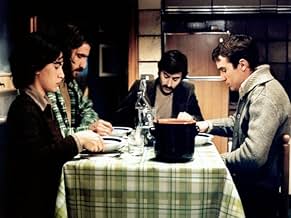CALIFICACIÓN DE IMDb
7.1/10
4.2 k
TU CALIFICACIÓN
El secuestro del político Aldo Moro de 1978 visto desde la perspectiva de uno de sus atacantes: una joven conflictiva de las filas de la Brigada Roja.El secuestro del político Aldo Moro de 1978 visto desde la perspectiva de uno de sus atacantes: una joven conflictiva de las filas de la Brigada Roja.El secuestro del político Aldo Moro de 1978 visto desde la perspectiva de uno de sus atacantes: una joven conflictiva de las filas de la Brigada Roja.
- Dirección
- Guionistas
- Elenco
- Premios
- 13 premios ganados y 21 nominaciones en total
Giulio Bosetti
- Paolo VI
- (as Giulio Stefano Bosetti)
Opiniones destacadas
On March 16, 1978, Aldo Moro, the Prime Minister of Italy, was kidnapped by a group of Communist revolutionaries known as the Red Brigade and held in captivity for 55 days. Through letters and photos sent by the kidnappers, the authorities learned that Moro had been given a "trial" by the Red Brigade and sentenced to death for his crimes against the proletariat of Italy - and, indeed, on May 9th of that year, his body was found, riddled with ten rounds of bullets, in the trunk of an abandoned car.
In "Good Morning, Night," writer/director Marco Bellochio takes the events and drains them of much of their sociopolitical significance, choosing instead to focus on the human drama at the story's core. Bellochio looks at the ambivalent feelings and conflicted motives underlying the kidnappers' actions, particularly in the case of an attractive young woman named Chiara (confidently played by Maya Sansa), who comes to question her commitment to "the cause" as the reality of what they are planning to do begins to sink in. It is largely through her eyes that we come to view the events and to see Moro less as an impersonal force to be manipulated for political purposes and more as a simple human being with all the fears, insecurities and desperate desire for life common to us all. Indeed, the political aspects stay largely in the background, relegated mainly to clips of stock footage showing us the principal players of the time dealing with the crisis.
With its dreamy visions, fantasy sequences, and tendency towards wild speculation, the film may frustrate those who would have preferred a more historically accurate, documentary approach to the topic. But Bellochio, as an artist, is less concerned with the "facts" of the case than with exploring the dilemma of the revolutionary's mindset. And to that end, he has done an exemplary job in "Good Morning, Night."
In "Good Morning, Night," writer/director Marco Bellochio takes the events and drains them of much of their sociopolitical significance, choosing instead to focus on the human drama at the story's core. Bellochio looks at the ambivalent feelings and conflicted motives underlying the kidnappers' actions, particularly in the case of an attractive young woman named Chiara (confidently played by Maya Sansa), who comes to question her commitment to "the cause" as the reality of what they are planning to do begins to sink in. It is largely through her eyes that we come to view the events and to see Moro less as an impersonal force to be manipulated for political purposes and more as a simple human being with all the fears, insecurities and desperate desire for life common to us all. Indeed, the political aspects stay largely in the background, relegated mainly to clips of stock footage showing us the principal players of the time dealing with the crisis.
With its dreamy visions, fantasy sequences, and tendency towards wild speculation, the film may frustrate those who would have preferred a more historically accurate, documentary approach to the topic. But Bellochio, as an artist, is less concerned with the "facts" of the case than with exploring the dilemma of the revolutionary's mindset. And to that end, he has done an exemplary job in "Good Morning, Night."
Based on a novel, the film describes the situation of Aldo Moro during his captivity. There is more than a meticulous realistic point of view given in this film : it tries to figure thoughts and attitudes of the kidnappers, members of brigate rosse. It explores the contradictions of hidden activists who are desperately trying to justify violent actions by the salvation of proletariat and rise of a social justice. They are seen in their loneliness, especially on the affective, emotional side. The psycho-rigidity of their mind is patent, not only in the sententious talks to their prisoner, in a certain desperate naivety to seek echos of their action in public opinion throughout medias, but also in the way they rule relationships. It's not politically that Moro's character strongly opposes to his kidnappers' characters, but rather in the way he's emotionnaly tied to his family (although being a prisonner, he can write letters), while the others seem alienated facing their own families (Mariano pretends to have cut any link to his son, Chiara tries to avoid familial phone calls and meetings, another member is mad about being away of his girl and suffers to be away from her mind and point of view when he sees her). Together, those members don't look like a family of a new kind. Maybe is it the main limit of Bellochio's movie, not to explore the way such an internal and autistic logical builds inside radical groups. But the movie spots a clearly defined place and time, focusing exclusively on elements linked to Moro's detention in a casual apartment (the gunfight of the kidnapping and then the death of the prisonner are seen indirectly throughout television). The strength of the movie is to develop a symbolic aspect with the character of Chiara's colleague (of her cover work) who defends imagination against the brutality of autocratic arbitrary. Almost fantastically, this character seems to guess Chiara's situation, writing a fiction about the events (like the movie we're effectively seeing as spectators) and modifying her feelings : when she realizes how any execution is horrible and unfair (reminding executions of italian partisani of WWII), it's too late and there is no other escape than in her own imagination (dream-like scene that the film also shows us). I believe it's a good and clever way to introduce us into such a historical event (maybe still wounding italian society), imagination. I also like the aspects and details of the movie that describe the importance of christianity in the conscience of the italians (even marxists ones, subconsciously) and critizises the sacrificial consensus into a falsely ineluctable execution but real murder.
I've read the other comments on this board and I would like to precise that Aldo Moro at the time was not the Italian President and that obviously the Red Brigades were out for his blood because he was working skilfully at a compromise between the Christian Democrats and the Communists and that meant for the extremists of the left to be cut out from any kind of power or hold they might have on the Government. The film itself does not seek to give political answers and is much more concerned with the human aspects of the drama. It's more lyrical than realistic... if you're looking for action or for a docudrama, you should probably go elsewhere.
The events bookending this movie are true, but the actual story is pure speculation...thus leaving the door wide open for the storytelling.
Communist Catholics are an oddity...the contradictions in that appellation alone are manifest. So what we have here is told somewhat in the manner of a Passion Play, cross-pollinated with a critique vs. defense of the Marx-Hegel "Holy Family"...the argument centers on the captive's immediate concern about execution, whereas the captors insist on demonstrating they are merciless.
The problem is, all of this seems to be going on as if there's no outside world of concern...oh, we get leakage in from TV and newspapers, but no sense that Rome is under lockdown. This ends up totally alienated from the central symbolism (Mora's body having been found precisely halfway between the respective Christian Democrats' and Italian Communist Party's headquarters). We're locked behind the writing (the stacks of books, and simultaneously, Chiara within the library), then left for dead with no spatial, political or symbolic context.
That said, there is some cleverness in the limitation placed on Chiara, who is the only one who can tell the story outside the apartment, but has a proximity barrier from the writer at the cubicle door and peephole. Upon reaching perigee, she is reduced to defiant tears. Note also how she dreams in Soviet-era propaganda films!
Communist Catholics are an oddity...the contradictions in that appellation alone are manifest. So what we have here is told somewhat in the manner of a Passion Play, cross-pollinated with a critique vs. defense of the Marx-Hegel "Holy Family"...the argument centers on the captive's immediate concern about execution, whereas the captors insist on demonstrating they are merciless.
The problem is, all of this seems to be going on as if there's no outside world of concern...oh, we get leakage in from TV and newspapers, but no sense that Rome is under lockdown. This ends up totally alienated from the central symbolism (Mora's body having been found precisely halfway between the respective Christian Democrats' and Italian Communist Party's headquarters). We're locked behind the writing (the stacks of books, and simultaneously, Chiara within the library), then left for dead with no spatial, political or symbolic context.
That said, there is some cleverness in the limitation placed on Chiara, who is the only one who can tell the story outside the apartment, but has a proximity barrier from the writer at the cubicle door and peephole. Upon reaching perigee, she is reduced to defiant tears. Note also how she dreams in Soviet-era propaganda films!
The true story of the kidnap of Italian political leader Aldo Moro by the Red Brigades in 1978 is turned into a haunting, disturbing tone poem of s film.
Eschewing realism, or the obvious tense, linear approach, this focuses on the experience through the eyes of one the young kidnappers, and her ever growing doubts about the righteousness of the mission. But rather than express this literally, we see it emerge in dream sequences, and behind her eyes.
Beautifully shot, with a terrific use of classical and modern music (Pink Floyd shows up more than once) this quiet nightmare of a film is far more effecting and thought provoking than most political dramas. It does not miss the irony that Aldo was a humanist who was actually inviting the communist party to be part of the government.
A great cautionary truth based fable about the danger of giving yourself completely and unquestioningly to any ideology, left or right, religious or secular.
Eschewing realism, or the obvious tense, linear approach, this focuses on the experience through the eyes of one the young kidnappers, and her ever growing doubts about the righteousness of the mission. But rather than express this literally, we see it emerge in dream sequences, and behind her eyes.
Beautifully shot, with a terrific use of classical and modern music (Pink Floyd shows up more than once) this quiet nightmare of a film is far more effecting and thought provoking than most political dramas. It does not miss the irony that Aldo was a humanist who was actually inviting the communist party to be part of the government.
A great cautionary truth based fable about the danger of giving yourself completely and unquestioningly to any ideology, left or right, religious or secular.
¿Sabías que…?
- TriviaMarco Bellocchio had already directed a documentary about the Red Brigades and the kidnapping of Aldo Moro: Sogni infranti (1995).
- ErroresNear the end, when Aldo Moro walks away in the deserted street, you can see a multicolored Peace flag in the background. Those flags would decorate Italian streets only in 2003, to oppose the invasion of Iraq.
- ConexionesEdited from Paisà (1946)
- Bandas sonorasMarcia trionfale
(from "Aida")
Composed by Giuseppe Verdi
Performed by Orchestra e Coro del Teatro dell'Opera di Roma
Conducted by Georg Solti
Decca Records, 1962
Selecciones populares
Inicia sesión para calificar y agrega a la lista de videos para obtener recomendaciones personalizadas
- How long is Good Morning, Night?Con tecnología de Alexa
Detalles
Taquilla
- Total en EE. UU. y Canadá
- USD 10,093
- Fin de semana de estreno en EE. UU. y Canadá
- USD 2,769
- 13 nov 2005
- Total a nivel mundial
- USD 4,240,918
- Tiempo de ejecución1 hora 46 minutos
- Color
- Mezcla de sonido
- Relación de aspecto
- 1.66 : 1
Contribuir a esta página
Sugiere una edición o agrega el contenido que falta

Principales brechas de datos
By what name was Buenos Días, Noche (2003) officially released in India in English?
Responda
